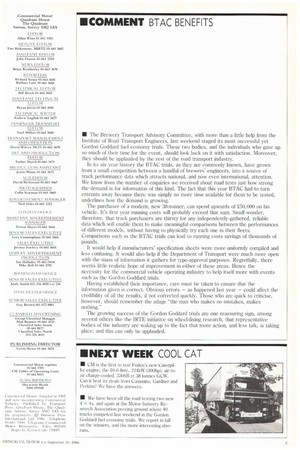• The Brewery Transport Advisory Committee, with more than a
Page 5

If you've noticed an error in this article please click here to report it so we can fix it.
little help from the Institute of Road Transport Engineers, last weekend staged its most successful yet Gordon Goddard fuel economy trials. These two bodies, and the individuals who gave up so much of their time for the event, should look back on it with satisfaction. Moreover, they should be applauded by the rest of the road transport industry.
In its six year history the BTAC trials, as they are commonly known, have grown from a small competition between a handful of brewers' engineers, into a source of truck performance data which attracts national, and now even international, attention. We know from the number of enquiries we received about road tests just how strong the demand is for information of this kind. The fact that this year BTAC had to turn entrants away because there was simply no more time available for them to be tested, underlines how the demand is growing.
The purchaser of a modern, new 38-tonner, can spend upwards of £50,000 on his vehicle. It's first year running costs will probably exceed that sum. Small wonder, therefore, that truck purchasers are thirsty for any independently-gathered, reliable data which will enable them to make meaningful comparisons between the performances of different models, without having to physically try each one in their fleets. Comparisons such as the BTAC trials can lead to running costs savings of thousands of pounds.
It would help if manufacturers' specification sheets were more uniformly compiled and less confusing. It would also help if the Department of Transport were much more open with the mass of information it gathers for type-approval purposes. Regretfully, there seems little realistic hope of improvement in either of these areas. Hence the necessity for the commercial vehicle operating industry to help itself more with events such as the Gordon Goddard trials.
Having established their importance, care must be taken to ensure that the information given is correct. Obvious errors — as happened last year — could affect the credibility of all the results, if not corrected quickly. Those who are quick to criticise, however, should remember the adage "the man who makes no mistakes, makes not hing. "
The growing sttccess of the Gordon Goddard trials are one reassuring sign, among several others like the IRTE initiative on wheel-fixing research, that representative bodies of the industry arc waking up to the fact that more action, and less talk, is taking place; and this can only be applauded.
























































































































